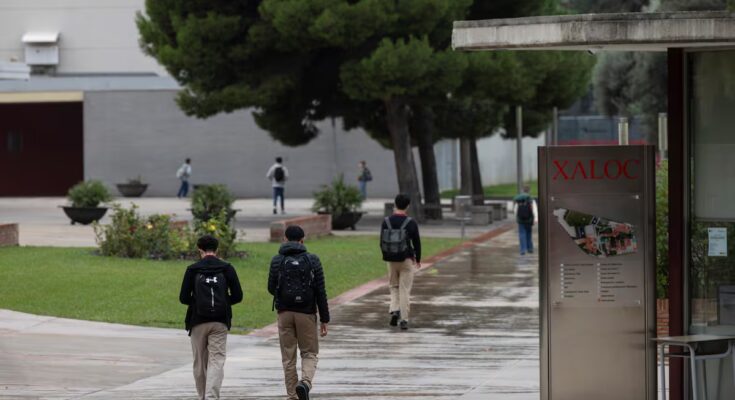Last Thursday 6th, at 8pm, the management of Avantis (children), of the Generalitat, which amounts to seven million. The news fell like a bucket of cold water, given that it means becoming a private center next September. “There was a lot of commotion, very worried families and, the next day, children crying at the school door because they didn’t want to lose their classmates,” says Mari, one of the mothers at the school.
The two schools, with 60 years of history and with a total of 2,800 students, do not speak of privatization, but of a “refoundation plan”, and assure that, although the state law on education, Lomloe, does not provide for the financing of schools that segregate students by sex, they will ask for the renewal of the agreement. The process to request these subsidies will begin in the next few weeks, both in primary and secondary schools, which will be completed in March. The large Catalan schools linked to Opus Dei have chosen to merge and strengthen themselves in order to be able to face a new stage in the form of private but differentiated schools. It is the path chosen by La Farga and La Vall, who will join, as well as Canigó and Viaró, and Bell-lloc will do with Les Alzines in Girona.
The privatization announcement has generated confusion and concern, as well as “anguish and anger” among families, who in some cases are against privatization. “If you have to choose between differentiated and concert, the majority prefers to keep the concert”, admit half a dozen fathers and mothers with whom this newspaper spoke at the gates of the Hospitalet schools this Friday. The families have organized themselves into several chat groups, the largest of which, and the most combative, has nearly 900 members.
The parents defend their right to choose the school and the type of education for their children, like everyone else, they reject the label of “elitist” school and remember that these schools were born in the Gornal neighborhood, “when there were only potato fields, to be able to give an education to the people of the neighborhood”, explains Carlos, who was also a student in Xaloc. In fact, they believe that, precisely with privatisation, it will become an elite school, “because there will only be families who will be able to pay for it”, adds Javier.
At the moment many of them are already making numbers. “They tell you that they use Excel, check their expenses and see if they can pay their taxes. We will try to resist, we will have to make cuts and reorganize the budget, but we will make the effort because the priority is values and educational level”, explains Javier. For Juan, however, it doesn’t work at the moment. “I have three girls and I will have difficulty paying, I don’t rule out looking for a second job,” he admits. Families currently pay almost 300 euros per month (excluding the dining room), a fee that will increase by around 100 euros more next year, and which will progressively increase until reaching 500 in 2030, according to the schools’ first forecasts.
Mari assures that she chose the school “for its proximity and the level of education”. “I like the separate school, but I prefer the concert. We are considering changing schools, but there are no places. My son has just started nursery school, if we had known before we would have already enrolled him in another school”, he complains. But families are aware that this option is not easy due to the endemic lack of squares that the city suffers from. “We don’t want to be sent to a school with a barracks.”
Students also experience anxiety over an uncertain future. “They are afraid and anxious about the possibility of losing their friends. The groups of friends are about to break up, because many of them are already saying in class that they will leave next year”, explain these parents, hoping that in the end this will not come true.
The families do not oppose the school’s decision, because they believe that it “defends its founding values” and focus attention on the Administration. “It’s a political decision, in other communities this doesn’t happen,” complains Javier. For this reason, the families’ idea is to ask the Hospitalet Municipality and the Education Department to gradually withdraw the concert, so that it involves new students, but that the conditions are maintained for those already enrolled in school.
300 vulnerable students have to move
The family associations of Xaloc and Pineda met with the Hospitalet city council on Tuesday to discuss the situation. “In the Municipality they are tremendously worried, they knew nothing about the school’s intentions, they discovered it together with us. They have set up a crisis office to manage the situation because they receive many questions and complaints”, say the associations. And now the Administration has two big problems on the table: one, managing the transfer requests of ordinary families. From the Student Family Associations They predict that the flight of families for the next academic year “will not be massive, but it will be generous”. Given the lack of empty seats at the Hospitalet, it is very likely that not everyone will make it. This year it has already happened with the schools of La Farga and La Vall, where of the 159 students from both centers who requested transfer, 112 were successful.
The second big problem is finding a place for vulnerable students, and this group is a priority, since they have been educated in these centers within the framework of the plan against school segregation, and with help or cheap backpack of 988 euros per year. When schools become private, centers will no longer be forced to accept these students, especially if they cannot pay the high fees. According to Education, between Xaloc and Pineda there are 296 vulnerable students – known as NESE B – enrolled in school, of which 203 are from L’Hospitalet. Neither the City Council nor the Education Department wanted to make a statement.
For their part, the school directors assure that they are looking for a way to help vulnerable families “who have expressed the desire to continue” in the center and make themselves available to the Administration to “find the best solution for all students”.



